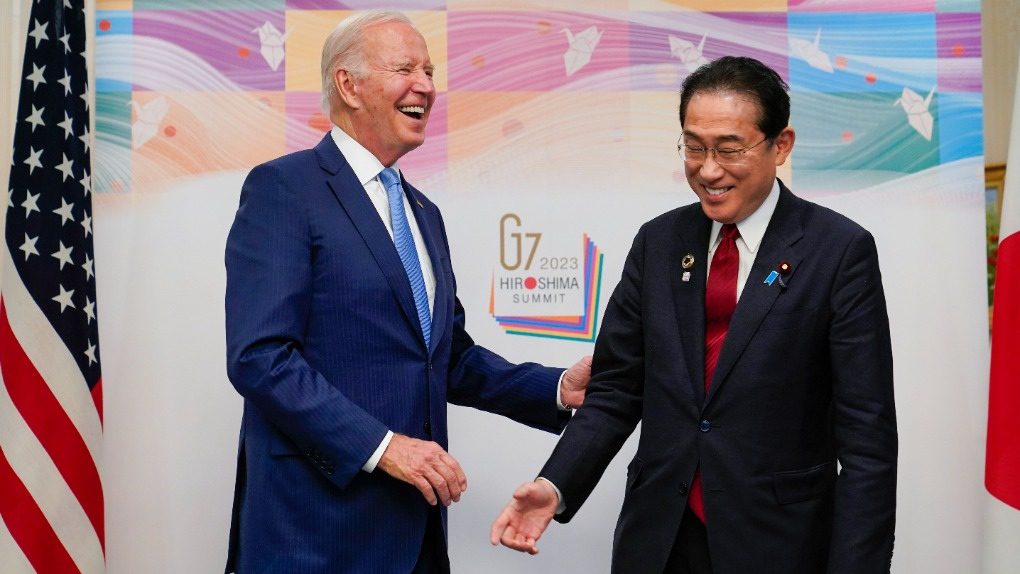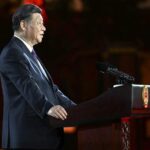Global Courant 2023-05-19 07:39:14
HIROSHIMA, Japan –
Leaders of the world’s most powerful democracies planned to devote much of the first full day of the Group of Seven summit to finding new ways to punish Russia for its 15-month invasion of Ukraine.
Russian President Vladimir Putin’s nuclear threats against Ukraine, along with North Korea’s months-long barrage of missile tests and China’s burgeoning nuclear arsenal, have echoed Japan’s push to make nuclear disarmament a major part of the summit. World leaders on Friday visited a peace park dedicated to the tens of thousands killed in the world’s first wartime nuclear bomb detonation.
After group photos and the planting of a symbolic tree, a new round of sanctions against Moscow would be announced, with a focus on redoubling efforts to enforce existing sanctions designed to suppress Russia’s war effort and those behind it are held accountable, a US official said. Russia is now the most sanctioned country in the world, but there are doubts about the effectiveness of the financial sanctions.
The US official, who spoke on condition of anonymity to preview the announcement, said the US leg of the actions would blacklist about 70 Russian and third countries involved in Russian defense production and more than 300 individuals, entities, aircraft and vessels. .
The official added that the other G7 countries would take similar steps to further isolate Russia and undermine its ability to wage war in Ukraine. Details would emerge over the course of the weekend summit.
The European Union was focused on closing the door on loopholes and plans to limit trade in Russian diamonds, European Council President Charles Michel told reporters on Friday.
He said the G7 will also try to make clear to leaders of countries that are not members of the summit why it is so important to impose sanctions.
Japanese Prime Minister Fumio Kishida, who represents Hiroshima in parliament, wants nuclear disarmament to be a major talking point, and he will formally begin the summit in Hiroshima’s Peace Memorial Park. World leaders’ visit to a park dedicated to preserving memories of August 6, 1945, when an American B-29 dropped an atomic bomb over Hiroshima, will be a striking image to start the summit. An estimated 140,000 people were killed and a rapidly dwindling number of now elderly survivors has made Hiroshima synonymous with anti-nuclear peace efforts.
On Thursday night, Kishida opened global diplomacy with a meeting with President Joe Biden after Biden’s arrival at a nearby military base. Kishida also held talks with British Prime Minister Rishi Sunak ahead of the three-day leaders’ meeting.
The alliance between Japan and the US is “the foundation of peace and security in the Indo-Pacific region,” Kishida said in the opening address to Biden. Japan, under threat from authoritarian China, Russia and North Korea, has expanded its military but also relies on 50,000 US troops stationed in Japan and US military might.
“We are delighted that the collaboration has progressed in leaps and bounds,” said Kishida.
Biden, who greeted US and Japanese troops at nearby Marine Corps Air Station Iwakuni before his meeting with Kishida, said: “When our countries work together, we are stronger, and I believe the whole world is safer when we do that. “
As G7 attendees made their way to Hiroshima, Moscow unleashed another airstrike on the Ukrainian capital. Loud explosions thundered through Kiev in the early hours, marking the ninth time this month that Russian airstrikes have targeted the city after weeks of relative calm.
“The crisis in Ukraine: I’m sure that’s where the conversation will start,” said Matthew P. Goodman, senior vice president of economics at the Center for Strategic and International Studies.
Speaking to reporters aboard Air Force One, White House national security adviser Jake Sullivan said there will be “discussions about the battlefield” in Ukraine and the “state of play on sanctions and the steps that will be taken.” the G7 will jointly undertake on enforcement in particular.”
The United States has frozen the funds of the Russian central bank, restricted banks’ access to SWIFT – the dominant system for global financial transactions – and imposed sanctions on thousands of Russian companies, government officials, oligarchs and their families.
Last year, the Group of Seven Countries collectively imposed a price cap of $60 per barrel on Russian oil and diesel. The finance ministry cites data from the Russian finance ministry showing that the Kremlin’s oil revenues from January to March this year were more than 40 percent lower than last year.
The economic impact of sanctions depends largely on a targeted country’s ability to circumvent them, according to a recent report from the Congressional Research Service. So over the past month, officials from the US Treasury Department have been touring Europe and Central Asia urging countries that still do business with the Kremlin to cut their financial ties.
“The challenge is to make sure that the sanctions are painful for Russia, not for us,” Michel said. “It is very clear that each package is more difficult than the previous one and requires more political effort to make a decision.”
G7 leaders and invited guests from several other provinces will also discuss how to deal with China’s growing assertiveness and military build-up as concerns mount that it could attempt to seize Taiwan by force, sparking a wider conflict. China claims the self-governing island as its own and its ships and warplanes regularly patrol the area.
Security in Hiroshima was tight, with thousands of police officers deployed throughout the city. A small group of protesters were significantly outnumbered by police when they gathered next to the ruins of the Atomic Peace Dome memorial on Wednesday night, which included signs reading “No G7 Imperialist Summit!”
In a bit of diplomatic dueling, Chinese President Xi Jinping hosts the leaders of the Central Asian countries of Kazakhstan, Kyrgyzstan, Tajikistan, Turkmenistan and Uzbekistan for a two-day summit in the Chinese city of Xi’an.
Leaders will discuss efforts to strengthen the global economy and address rising prices that are straining households and government budgets around the world, particularly in developing countries in Africa, Asia and Latin America.
The debate over raising the debt limit in the US, the world’s largest economy, threatens to overshadow the G7 talks. Biden plans to rush back to Washington after the summit for debt negotiations and scrap planned meetings in Papua New Guinea and Australia.
The British Prime Minister arrived in Japan earlier Thursday and visited the JS Izumo, a vessel capable of carrying helicopters and fighter jets that can take off and land vertically.
At their bilateral meeting Thursday, Sunak and Kishida announced a series of agreements on defense, among others; trade and investment; technology and climate change, Sunak’s office said.
The G7 includes Japan, the United States, the United Kingdom, France, Germany, Canada and Italy, as well as the European Union.
A host of other countries have been invited to the summit in hopes of strengthening ties with non-G7 countries while gaining support for efforts such as isolating Russia.
Leaders from Australia, Brazil, India, Indonesia and South Korea are among the guests. Ukrainian President Volodymyr Zelenskyy is expected to join via video link.
—-
Associated Press writers Josh Boak, Adam Schreck and Mari Yamaguchi in Hiroshima, and Fatima Hussein in Washington contributed to this report.








